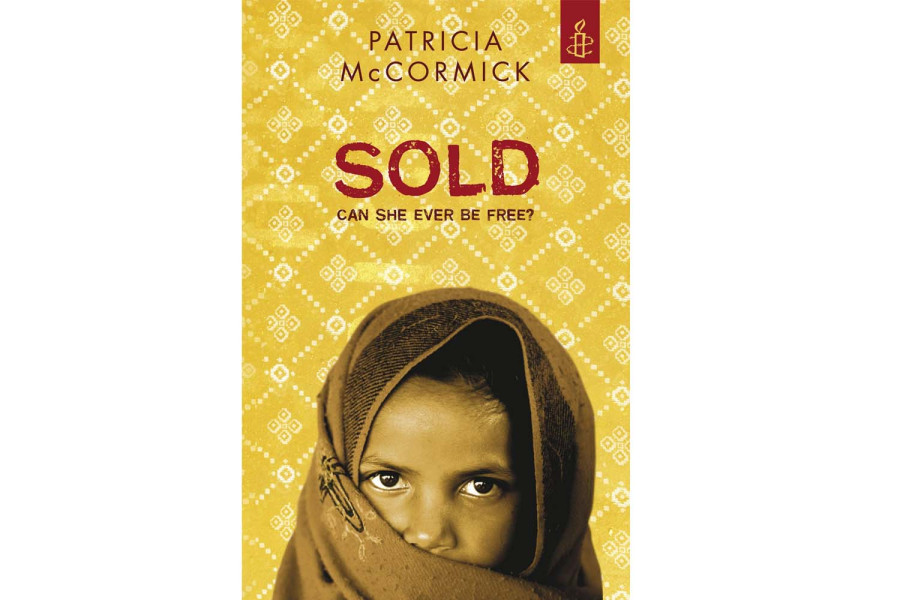Books
‘Sold’: A look at child trafficking
Patricia McCormick’s fiction tells the story of a Nepali girl trapped in a cruel world of exploitation.
Skanda Swar
Patricia McCormick’s ‘Sold’ confronts one of humanity’s most disturbing realities through the eyes of a thirteen-year-old Nepali girl named Lakshmi. Published in 2006, this young adult novel has opened the eyes of readers worldwide to the harsh truth of human trafficking. What makes this book remarkable is its unflinching portrayal of a painful subject and McCormick’s ability to tell the story with brutal honesty and deep compassion.
The story traces Lakshmi’s journey from her impoverished mountain village in Nepal, where farming offers little more than survival, to the brothels of Kolkata, India, where survival becomes even more uncertain. What begins as a promise of work as a maid in the city, a chance to support her struggling family, quickly unravels into a nightmare of exploitation and abuse.
McCormick’s decision to narrate the story in brief, verse-like chapters adds a sense of urgency and disorientation, echoing Lakshmi’s growing confusion and horror as she slowly comes to understand the grim reality of her situation.
From a literary perspective, McCormick’s writing is deceptively powerful. Her prose is simple and accessible, especially for young adult readers, yet it carries deep emotional weight. A line like “I have been sold” is plain but hits with devastating force. The short, fragmented chapters feel like sharp breaths—mirroring how trauma breaks memory and experience into pieces. Even the white space on the page feels intentional, symbolising the silence and pain that words alone cannot express.
That stylistic choice works beautifully for several reasons. First, it breaks down the heavy subject matter into manageable pieces, making it easier for young readers to process without feeling overwhelmed. Second, it mirrors the way traumatic memories often emerge—in fragments, flashes, and glimpses rather than full narratives. Third, it treats both the subject and the reader with dignity, avoiding sensationalism and instead offering a respectful, honest portrayal of unimaginable hardship.
Reading ‘Sold’ changed the way I view global inequality and human rights. McCormick approaches her subject with neither sensationalism nor detachment, but with deep dignity and respect. There were moments I had to pause—not because of the writing, but because the reality of what millions of children endure struck me so forcefully. Her words challenge us to confront our own comfort and complacency while witnessing the story of a girl who has neither.
What left an indelible mark on me was McCormick’s ability to stand beside the horrors of Lakshmi’s situation and still highlight the quiet heroism within it. Even in the darkest moments, Lakshmi’s inner strength and dignity shine through like points of light in the abyss. She clings to her humanity—teaching herself to read from a Coca-Cola advertisement, forming bonds with other girls in the brothel, and holding tightly to memories of her family and home.
The authenticity of McCormick’s writing comes from deep, on-the-ground research. She spent time in Nepal and India, speaking with survivors, aid workers, and visiting shelters—witnessing firsthand the conditions that push families into the hands of traffickers. This depth is reflected in every detail, from monsoon rains ruining fragile crops to Lakshmi’s complex emotions toward her captors. The cultural nuances feel natural and respectful, not borrowed or forced. Most importantly, the story views the economic desperation of these families with compassion, not judgment, offering understanding instead of blame.
McCormick succeeds where many social-issue novels falter—by avoiding preachiness. She doesn’t lecture readers about human trafficking; instead, she allows us to grasp its horror through Lakshmi’s experience. The emotional impact builds naturally, through quiet, powerful moments, rather than through forced drama or sensationalism. While the story includes clear villains—the traffickers, brothel owners, and the men who buy children—McCormick also exposes the deeper roots of the crisis: systemic poverty and gender inequality that make such exploitation possible in the first place.
The writer is careful not to offer easy answers to a deeply complex, global issue. Lakshmi’s stepfather is not portrayed as a villain, but as a man crushed by poverty who makes one terrible decision. Likewise, the American who helps secure Lakshmi’s freedom at the end is not cast as a ‘white saviour’, but simply as one of many people trying to help within a broken system. This thoughtful approach respects both the complexity of the issue and the intelligence of the reader, avoiding stereotypes and simplistic solutions.
The book’s conclusion stands out for its honesty. Lakshmi is rescued, but her trauma remains. McCormick does not describe a quick or easy recovery. This choice respects survivors by avoiding false hope. The final chapters offer hope and healing while acknowledging the lasting impact of such experiences.
Beyond its literary strengths, ‘Sold’ pushes readers toward awareness and action. After finishing the book, I explored statistics on human trafficking, researched organisations working to combat it, and began to rethink global inequality and women’s rights. Turning a reader into an advocate is perhaps the greatest achievement of socially conscious literature—changing not just how we feel, but how we think and act.
For young adult readers especially, this novel is both an introduction to global social issues and a testament to human resilience. It proves that literature can be simultaneously beautiful and brutal, hopeful and heartbreaking. McCormick has created a work that honours the experiences of trafficking survivors while educating readers about a crisis affecting millions worldwide.
‘Sold’ is not an easy book to read, nor should it be. McCormick has crafted essential reading for anyone who believes in literature’s power to foster empathy and inspire change. She offers us a difficult truth wrapped in a gift—leaving readers more aware, compassionate, and determined to make a difference.
_____
Sold: Can She Ever Be Free?
Author: Patricia McCormick
Publisher: Hyperion Book CH
Year: 2006
Pages: 272




 13.54°C Kathmandu
13.54°C Kathmandu










